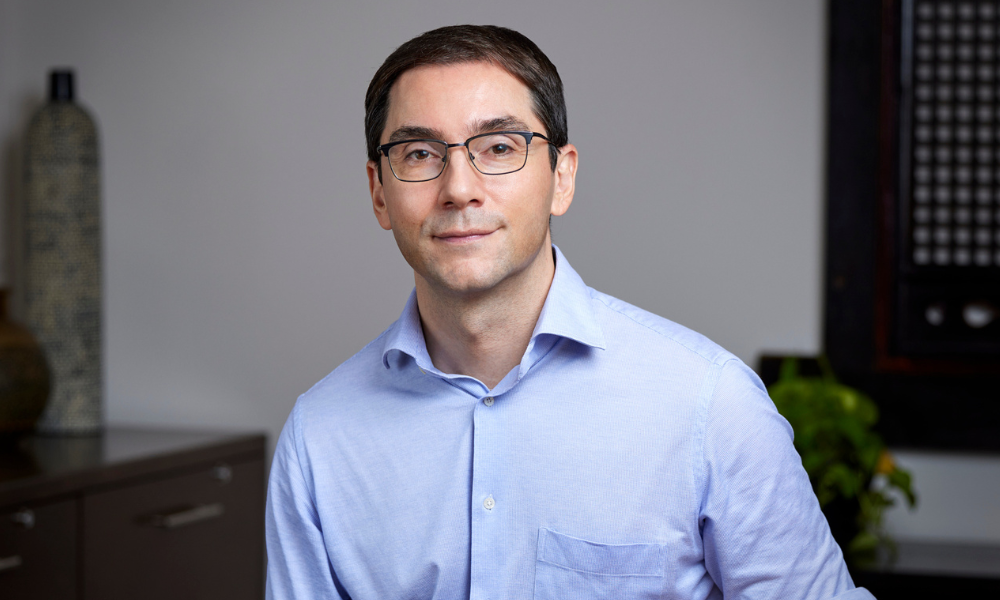
David Milosevic's approach may seem moderate, but it belies deep concerns about where Convocation is headed

This article was produced in partnership with Milosevic & Associates.
According to David Milosevic, the most significant issue in the Law Society of Ontario (LSO) bencher election is one his candidacy represents: independence.
While so much of the attention in this year’s election has been taken up by two large slates battling for control of Convocation, the FullStop slate and the Good Governance Coalition, David Milosevic is raising the alarm about the existential threat this represents for the LSO.
“It's important because we have politics entering the doors of Convocation. And that is, from my point of view, a real threat to self-regulation,” Milosevic explains. “If we have slates entering Convocation, then what happens? Well, we have the immediate effect, which is polarization. You’ve got half the bar that doesn’t feel Convocation is representative anymore.”
And that politicization potentially has far-reaching consequences. Milosevic imagines an all-too-plausible scenario where the politics of the LSO conflict with the politics of Ontario’s ruling party. “Government would have a greater incentive to revoke self-regulation,” he says, adding that it’s not just about maintaining good relations with governments. A polarized and politicized LSO may undermine public confidence that regulation is being guided by the needs of the public, rather than the demands of internal LSO politics. “This all undermines self-regulation in the long run. It’s why slates are out of keeping with the tradition of the bar, which is independent benchers – people who've demonstrated good judgment and the ability to work with their colleagues,” he says.
Milosevic isn’t alone in his concern. One of the key planks of the Good Governance Coalition’s platform is ensuring slates don’t take hold in future elections. “Almost all of them have recognized that the slate system is a risk, and is a necessary evil, or a sign of dysfunction. No one’s arguing that this is a good thing. The argument is that it's temporarily necessary,” he says.
But Milosevic is also skeptical that slates will be temporary if any one group dominates convocation, while questioning their necessity, too. “Right now, what we need more than anything in this election, are a few independents to get into Convocation – people with the actual incentive to sit on that committee so the committee works. Otherwise, self-regulation is over.”
And while it may seem counter-intuitive, Milosevic’s independent run is meant to foster a more united Convocation, one with the ability to address pressing issues together, regardless of politics. Like, for instance, the issue of Artificial Intelligence. “That issue is going to hit us hard,” he says. “It won’t wipe out lawyers for one specific purpose: the law. ‘Provisions for legal services in Ontario can only be provided by lawyers,’ You can ask ChatGPT a bunch of things, but when you need something done officially, you’ll need a lawyer. So we have the monopoly.” But he’s quick to clarify that that protection may not be permanent. “What I say to colleagues who might breathe a little easier behind that wall, is that it’s a very thin wall.” As pressure mounts from the public who can access AI services cheaply and easily, he warns that the government may also use that growing demand as a justification to limit the LSO’s self-governance.
Milosevic doesn’t have any easy answers. But he’s sure that the solution should be found together. “All the squabbles about cultural issues are like the old saying about arranging deck chairs on the Titanic. We need to organize and plan and prioritize. It’s a problem we better face together.”
He notes that AI will have the most impact on young lawyers. A concern for the next generation of lawyers is a common thread in the issues he hopes to tackle as a bencher. Aside from AI, there is the articling crisis, wherein 29,000 law students will fight for 11,000 articling positions, for which he advocates for the normalization of the Law Practice Program. But his biggest concern is for solo practitioners and small firms.
“The vast majority of lawyers who are subjected to any kind of disciplinary proceedings at the LSO are solo and small firm lawyers. These lawyers generally don't have enough resources,” he says. “We need to target resources to the solo and small firm lawyers, particularly with basic bookkeeping.” He estimates that about 60 percent of the complaints against lawyers originate from how they handle funds or violate reporting requirements mandated by the law society. “This is an educational issue. It’s where support can help these lawyers. By ensuring that we have well-qualified solo and small firm practitioners, what are we protecting? We're protecting the public. We're enhancing the ability to provide access to justice. We're hitting all the aspects of our mandate. And we're supporting our colleagues.”
Of course, Milosevic is clear-eyed about his chances of being heard above the loud, culture war chaos of the battling slates, but that just emphasizes how important independent voices are, “I am standing in the face of a tsunami. I understand that the overwhelming likelihood is that the tsunami wipes me and other people with an independent voice out. And what I say is fine, because anyone who wants to enter some sort of service to their profession, or the public, if they're not willing to do it standing on principle, there is not much point to it.”
David’s practice is focused on complex commercial litigation, fraud, and securities litigation. He has acted on some of the largest civil fraud claims in Ontario and has extensive experience managing complex litigation involving large volumes of documentary disclosure and multiple parties. David takes a long range, strategic approach to litigation, and has a proven track record of obtaining results for his clients.